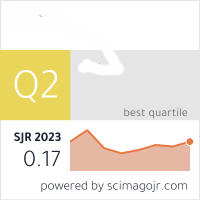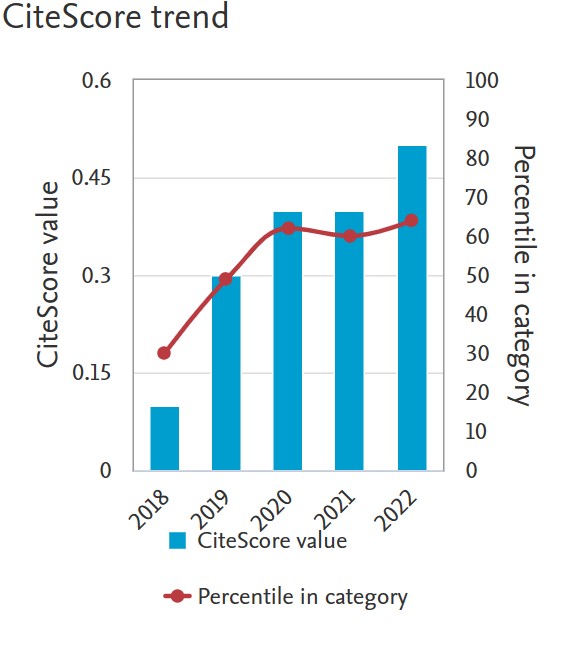Assessment of Vitamin D Level as a Risk Factor and Illness Severity Indicator in COVID 19 Cases
Abstract
Background: The severe acute respiratory syndrome coronavirus 2 (SARS-COV2) viruses using angiotensin converting enzyme 2 (ACE2) receptors, to enter human cells, these receptors are highly expressed in the lung alveolar cells, vascular endothelium, cardiac myocytes, and other cells. Inadequate vitamin D levels in the blood have been linked to a higher risk of COVID-19 severity. Objective: To determine the association between Vitamin D level and severity of COVID-19 infection. Materials and Method: A cross sectional study was conducted at Thumbay Hospital, Ajman, UAE. Enrolled 70 COVID-19 positive hospitalized patients with age group ≥ 18 years old of both genders. Patients taking vitamin D supplements were excluded from the study. The biochemical analysis for the collected blood samples was performed on the automated analyzer and assessed for significance analysis. Result: There is a statistically significant correlation between Vitamin D levels and disease severity (p < 0.05) as determined by Pearson’s Chi-square test. Independent t-test shown that there is a statistically significant difference with regards to gender, age groups, and co morbidity (p < 0.05). Pearson’s correlation revealed a moderate, positive correlation between Vitamin D levels and the severity of COVID-19 infection, which was statistically significant. Conclusion: Vitamin D levels affect COVID- 19 severity, with more severe cases showing vitamin D levels lower than normal when compared to severe cases with sufficient vitamin D levels. Furthermore, blood vitamin D levels are linked to age groups in COVID-19 patients. Vitamin D insufficiency and deficiency, on the other hand, was not linked to a higher risk of death prognosis, and co morbidities.
Downloads
References
Al-Harbi S, Al-Harbi YA, Ezzat Abdellatif A, AlAhmadey ZZ, & Alahmadi S (2021) Retrospective
evaluation of the serum level of vitamin D among
COVID-19 patients in Al Madinah, Saudi Arabia.
Biotechnol Biochem Res 9 (1): 8-13. DOI:
https://doi.org/10.30918/BBR.91.21.018
Alipio M (2020) Vitamin D supplementation
could possibly improve clinical outcomes of
patients infected with coronavirus-2019
(COVID-19). SSRN Electronic Journal.
DOI: http://dx.doi.org/10.2139/ssrn.3571484
AlSafar H, Grant WB, Hijazi R, Uddin M,
Alkaabi N et al. (2021) COVID-19 disease
severity and death in relation to vitamin D
status among SARS-CoV-2-positive UAE
residents. Nutrients 13 (5): 1714. DOI:
https://doi.org/10.3390/nu13051714
Bassatne A, Basbous M, Chakhtoura M, El
Zein O, Rahme M et al. (2021) The link
between COVID-19 and VItamin D
(VIVID): A systematic review and metaanalysis. Metabolism 119: 154753. DOI:
https://doi.org/10.1016/j.metabol.2021.154753
Ben-Eltriki M, Hopefl R, Wright JM, & Deb S (2022)
Association between vitamin D status and risk of
developing severe COVID-19 infection: a metaanalysis of observational studies. Journal of the
American Nutrition Association 41 (7): 679-689.
DOI:https://doi.org/10.1080/07315724.2021.1951891
Bilezikian JP, Bikle D, Hewison M, Lazaretti-Castro
M, Formenti AM et al. (2020) Mechanisms in
endocrinology: vitamin D and COVID-19.
European journal of endocrinology 183 (5): R133-
R147. DOI: https://doi.org/10.1530/EJE-20-0665
Braun A, Chang D, Mahadevappa K, Gibbons FK, Liu
Y et al. (2011) Association of low serum 25-
hydroxyvitamin D levels and mortality in the
critically ill. Critical care medicine 39 (4): 671–677.
DOI:https://doi.org/10.1097/CCM.0b013e318206ccdf
Cereda E, Bogliolo L, Klersy C, Lobascio F, Masi S et
al. (2021) Vitamin D 25OH deficiency in COVID-
patients admitted to a tertiary referral hospital.
Clinical nutrition 40 (4): 2469-2472. DOI:
https://doi.org/10.1016/j.clnu.2020.10.055
Charoenngam N, Shirvani A, Reddy N, Vodopivec
DM, Apovian CM et al. (2021) Association of
vitamin D status with hospital morbidity and
mortality in adult hospitalized patients with
COVID-19. Endocrine Practice 27 (4): 271-278.
DOI: https://doi.org/10.1016/j.eprac.2021.02.013
Childs CE, Calder PC, & Miles EA (2019) Diet and
immune function. Nutrients 11 (8): 1933. DOI:
https://doi.org/10.3390/nu11081933
de Haan K, Groeneveld A, de Geus HR, Egal M, &
Struijs A (2014) Vitamin D deficiency as a risk
factor for infection, sepsis and mortality in the
critically ill: systematic review and metaanalysis. Critical care 18 (6): 1-8. DOI:
https://doi.org/10.1186/s13054-014-0660-4
De Smet D, De Smet K, Herroelen P, Gryspeerdt S,
& Martens GA (2021) Serum 25 (OH) D level
on hospital admission associated with COVID-
stage and mortality. American journal of
clinical pathology 155 (3): 381-388. DOI:
https://doi.org/10.1093/ajcp/aqaa252
Dong Y, Mo X, Hu Y, Qi X, Jiang F et al. (2020)
Epidemiology of COVID-19 among children in
China. Pediatrics 145 (6): e20200702. DOI:
https://doi.org/10.1542/peds.2020-0702
Emami A, Javanmardi F, Pirbonyeh N, & Akbari A
(2020) Prevalence of underlying diseases in
hospitalized patients with COVID-19: a
systematic review and meta-analysis. Archives of
academic emergency medicine 8 (1): e35. URL:
https://www.ncbi.nlm.nih.gov/pmc/articles/PM
C7096724
Escobar GJ, Adams AS, Liu VX, Soltesz L, Chen YFI et al. (2021) Racial disparities in COVID-19
testing and outcomes: retrospective cohort study
in an integrated health system. Annals of
internal medicine 174 (6): 786-793. DOI:
https://doi.org/10.7326/M20-6979
Ghelani D, Alesi S, & Mousa A (2021) Vitamin D and
COVID-19: An overview of recent evidence.
International Journal of Molecular Sciences 22 (19):
DOI: https://doi.org/10.3390/ijms221910559
Grant WB, Lahore H, McDonnell SL, Baggerly CA,
French CB et al. (2020) Evidence that vitamin D
supplementation could reduce risk of influenza and
COVID-19 infections and deaths. Nutrients 12 (4):
DOI: https://doi.org/10.3390/nu12040988
Greiller CL, & Martineau AR (2015) Modulation of
the immune response to respiratory viruses by
vitamin D. Nutrients 7 (6): 4240-4270. DOI:
https://doi.org/10.3390/nu7064240
Guan W-j, Ni Z-y, Hu Y, Liang W-h, Ou C-q et al.
(2020) Clinical characteristics of coronavirus
disease 2019 in China. New England Journal of
Medicine 382 (18): 1708-1720. DOI:
https://doi.org/10.1056/NEJMoa2002032
Hastie CE, Mackay DF, Ho F, Celis-Morales CA,
Katikireddi SV et al. (2020) Vitamin D
concentrations and COVID-19 infection in UK
Biobank. Diabetes & Metabolic Syndrome:
Clinical Research & Reviews 14 (4): 561-565.
DOI: https://doi.org/10.1016/j.dsx.2020.04.050
Infante M, Buoso A, Pieri M, Lupisella S, Nuccetelli M et
al. (2022) Low vitamin D status at admission as a risk
factor for poor survival in hospitalized patients with
COVID-19: an Italian retrospective study. Journal of
the American Nutrition Association 41 (3): 250-265.
DOI: https://doi.org/10.1080/07315724.2021.1877580
Jain A, Chaurasia R, Sengar NS, Singh M, Mahor S
et al. (2020) Analysis of vitamin D level among
asymptomatic and critically ill COVID-19
patients and its correlation with inflammatory
markers. Scientific reports 10 (1): 20191. DOI:
https://doi.org/10.1038/s41598-020-77093-z
Katz J, Yue S, & Xue W (2021) Increased risk
for COVID-19 in patients with vitamin D
deficiency. Nutrition 84: 111106. DOI:
https://doi.org/10.1016/j.nut.2020.111106
Kazemi A, Mohammadi V, Aghababaee SK,
Golzarand M, Clark CC et al. (2021)
Association of vitamin D status with SARSCoV-2 infection or COVID-19 severity: a
systematic review and meta-analysis.
Advances in Nutrition 12 (5): 1636-1658. DOI:
https://doi.org/10.1093/advances/nmab012
Li Y, & Ding S (2020) Serum 25-Hydroxyvitamin D and
the risk of mortality in adult patients with Sepsis: A
meta-analysis. BMC infectious diseases 20 (1): 1-10.
DOI: https://doi.org/10.1186/s12879-020-4879-1
Liang JJ, Liu J, Chen Y, Ye B, Li N et al. (2020)
Characteristics of laboratory findings of COVID-19
patients with comorbid diabetes mellitus. Diabetes
research and clinical practice 167: 108351. DOI:
https://doi.org/10.1016/j.diabres.2020.108351
Mehra MR, Desai SS, Kuy S, Henry TD, & Patel
AN (2020) Cardiovascular disease, drug
therapy, and mortality in Covid-19. New
England Journal of Medicine 382 (25): e102.
DOI: https://do.org/10.1056/NEJMoa2007621
Meltzer DO, Best TJ, Zhang H, Vokes T, Arora V et al.
(2020) Association of vitamin D status and other
clinical characteristics with COVID-19 test results.
JAMA network open 3 (9): e2019722. DOI:
https://doi.org/10.1001/jamanetworkopen.2020.19722
Murdaca G, Pioggia G, & Negrini S (2020) Vitamin
D and Covid-19: an update on evidence and
potential therapeutic implications. Clinical
and Molecular Allergy 18: 1-8. DOI:
https://doi.org/10.1186/s12948-020-00139-0
Parveen R, Sehar N, Bajpai R, & Agarwal NB (2020)
Association of diabetes and hypertension with
disease severity in covid-19 patients: A systematic
literature review and exploratory meta-analysis.
Diabetes research and clinical practice 166: 108295.
DOI: https://doi.org/10.1016/j.diabres.2020.108295
Raimondi F, Novelli L, Ghirardi A, Russo FM,
Pellegrini D et al. (2021) Covid-19 and gender:
lower rate but same mortality of severe disease
in women—an observational study. BMC
pulmonary medicine 21 (1): 1-11. DOI:
https://doi.org/10.1186/s12890-021-01455-0
Rhodes JM, Subramanian S, Laird E, Griffin G, &
Kenny RA (2021) Perspective: Vitamin D
deficiency and COVID‐19 severity–plausibly
linked by latitude, ethnicity, impacts on
cytokines, ACE2 and thrombosis. Journal of
internal medicine 289 (1): 97-115. DOI:
https://doi.org/10.1111/joim.13149
Sanyaolu A, Okorie C, Marinkovic A, Patidar R,
Younis K et al. (2020) Comorbidity and its
impact on patients with COVID-19. SN
comprehensive clinical medicine 2: 1069-1076.
DOI: https://doi.org/10.1007/s42399-020-00363-4
Somasundaram NP, Ranathunga I, Ratnasamy V,
Wijewickrama PSA, Dissanayake HA et al.
(2020) The impact of SARS-Cov-2 virus
infection on the endocrine system. Journal of the
Endocrine Society 4 (8): bvaa082. DOI:
https://doi.org/10.1210/jendso/bvaa082
Taha R, Abureesh S, Alghamdi S, Hassan RY,
Cheikh MM et al. (2021) The relationship
between vitamin D and infections including
COVID-19: any hopes? International journal
of general medicine: 3849-3870. URL:
https://www.tandfonline.com/doi/full/10.2147/I
JGM.S317421
Wang Z, Joshi A, Leopold K, Jackson S,
Christensen S et al. (2022) Association of
vitamin D deficiency with COVID‐19 infection
severity: Systematic review and meta‐analysis.
Clinical Endocrinology 96 (3): 281-287. DOI:
https://doi.org/10.1111/cen.14540
Zhang J, McCullough PA, & Tecson KM (2020)
Vitamin D deficiency in association with
endothelial dysfunction: Implications for
patients withCOVID-19. Reviews in
cardiovascular medicine 21 (3): 339-344. DOI:
Downloads
Published
Issue
Section
License
You are free to:
- Share — copy and redistribute the material in any medium or format for any purpose, even commercially.
- Adapt — remix, transform, and build upon the material for any purpose, even commercially.
- The licensor cannot revoke these freedoms as long as you follow the license terms.
Under the following terms:
- Attribution — You must give appropriate credit , provide a link to the license, and indicate if changes were made . You may do so in any reasonable manner, but not in any way that suggests the licensor endorses you or your use.
- No additional restrictions — You may not apply legal terms or technological measures that legally restrict others from doing anything the license permits.
Notices:
You do not have to comply with the license for elements of the material in the public domain or where your use is permitted by an applicable exception or limitation .
No warranties are given. The license may not give you all of the permissions necessary for your intended use. For example, other rights such as publicity, privacy, or moral rights may limit how you use the material.











